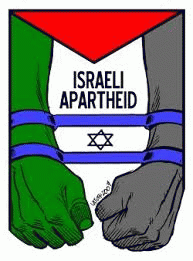US Secretary of State John Kerry spent last week testing the waters with Israelis and Palestinians over his so-called framework agreement -- designed to close the gaps between the two sides. But the issues he is trying to resolve appear more intractable by the day.
As he headed to the region, Israel's hawkish cabinet ministers gave their blessing to legislation to annex the Jordan Valley, a large swath of the West Bank that might otherwise be the Palestinian state's economic backbone and gateway to the outside world.
To underscore their point, the interior minister, Gideon Saar, a close friend of prime minister Benjamin Netanyahu, led a group of rightwing politicians on a tour of the valley during which they held a dedication ceremony for a new settlement neighbourhood.
In a speech there, the deputy foreign minister, Zeev Elkin, averred that the Jordan Valley must remain under "Israeli sovereignty forever." Without it, Israel would return to what he called the "Auschwitz borders" before the 1967 occupation began.
On Sunday, as Kerry left, the defence minister, Moshe Yaalon, added a new condition: peace was impossible, he argued, as long as the Palestinians and their schoolbooks "incited" against Israel, even quoting from a government-compiled "Palestinian incitement index."
The hyperbole overshadowed two Israeli surveys that might one day provide a yardstick by which to judge an equivalent "Israeli incitement index."
An opinion poll revealed that nearly two-thirds of Israeli Jews believe the conflict's Palestinian narrative -- including the nakba, the great dispossession of the Palestinians in 1948 to create Israel -- should be taught in schools. This flies in the face of Netanyahu's own view. His government passed a law in 2011 effectively banning public institutions from giving a platform to nakba commemorations.
The other study, following an experiment in a handful of schools, demonstrated that, when Jewish students are exposed to spoken Arabic at an early age, between 10 and 12, they hold dramatically less hostile and stereotypical views of Arabs. Currently, many Jewish students never learn Arabic.
With the experimental program employing teachers from Israel's large Palestinian minority, the study noted that for most of the Jewish children it was the first time they had developed a close relationship with an Arab.
The education ministry, however, was reported to have waved aside the findings and is apparently failing to fund the existing, small program, let alone expand it.
This is no oversight. Successive Israeli governments have carefully engineered the structure of Israeli society to ensure that Jewish and Palestinian citizens, the latter comprising a fifth of the population, are kept in separate linguistic, cultural, educational and emotional worlds.
The reasoning is not hard to discern. The last thing Israeli leaders want is for Jewish and Palestinian citizens to develop shared interests, forge friendships and act in solidarity. That would start to erode the rationale for a Jewish state, especially one premised on the supposed need of the Jews to defend themselves from a hostile world -- "the villa in the jungle", as former prime minister Ehud Barak once characterised Israel.
In short, a Jewish state's future precisely depends on the anti-Arab stereotypes inculcated in young Israeli minds. It may not therefore be coincidental that, as Israel has faced increasing pressure over the past 20 years to make peace, the separation of Jews from Palestinians has entrenched.
Today most Israeli Jews rarely meet a Palestinian, and especially not one from the West Bank or Gaza. It is easy to forget that before the 1993 Oslo accords, many Israeli Jews regularly ventured into Palestinian areas, to shop, eat and fix their cars. Palestinians, meanwhile, were evident in Israeli communities, even if only as builders or waiters.
It may have been a very unequal, even colonial encounter, but nonetheless it made it hard for Israelis to demonize their neighbors. Such contacts are now a distant memory. And that is precisely how leaders like Netanyahu want to keep it.
Inside Israel, the direction of policy is the same. In recent weeks, the government has insisted on raising the electoral threshold in a barely concealed effort to rid the parliament of Arab parties. Legislation is also being revived to tax into oblivion human rights organisations, those that give a voice to Palestinians in Israel and the occupied territories.
(Note: You can view every article as one long page if you sign up as an Advocate Member, or higher).






